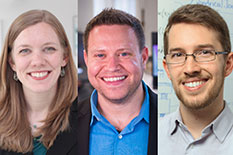Clark School Faculty Receive CAREER Awards
Three faculty members of the University of Maryland’s A. James Clark School of Engineering have received Faculty Early Career Development (CAREER) awards from the National Science Foundation (NSF). The CAREER Program offers NSF’s most prestigious awards in support of early-career faculty who have the potential to serve as academic role models in research and education and to lead advances in the mission of their department or organization. Mark FugeAssistant Professor, Department of Mechanical Engineering and Institute for Systems Research The CAREER award will enable Fuge to expand his research at the intersection of engineering design and machine learning, with the goal of enabling computers that learn how to design complex systems like new aircraft or vehicles. Through the research, he also aims to create educational opportunities that would broaden access to new machine learning techniques for students from high school through graduate school. The project specifically focuses on design representation, or the underlying mathematics behind how computers describe something like an aircraft. Fuge’s research will study new machine learning algorithms that can combine the different ways of describing an aircraft—for example, its shape or geometry, what it’s made from, and how complex wiring and components connect within an aircraft—into one holistic picture, using new tools from advanced areas of mathematics, such as differential geometry and statistics. If successful, this approach could help humans design better, faster, more efficient, but less expensive systems to address technological challenges such as climate change or develop new forms of energy production or transportation. Learn more about Fuge’s CAREER award Ryan SocholAssistant Professor, Department of Mechanical Engineering and Fischell Department of Bioengineering The CAREER award will enable Sochol to expand his research in the area of additive nanomanufacturing, or 3D nanoprinting, with multiple materials, as well as enable him to form the infrastructure for an education, mentoring, and outreach program. Direct laser writing is a type of 3D printing that uses light to solidify reactive liquids in order to build objects nearly 1,000 times smaller than the thickness of a human hair. Historically, printing such small structures with more than one material was expensive, slow, and imprecise until Sochol’s group introduced microfluidic direct laser writing (μF-DLW). One of the biggest challenges preventing the μF-DLW approach from being used more broadly is the current inability to reliably, repeatedly, and accurately print multi-material objects that are much taller than they are wide, such as a microscale Eiffel Tower. Sochol’s research will work towards understanding why this limitation exists for such high-aspect-ratio microstructures, and then develop new approaches to address and overcome them. If successful, the ability to manufacture sophisticated microsystems made of multiple, fully integrated materials—designed with unique optical, biological, chemical, electrical, and/or mechanical properties—could open doors for emerging applications across a variety of fields. Learn more about Sochol’s CAREER award Kimberly StrokaAssistant Professor, Fischell Department of Bioengineering The CAREER award will support Stroka’s efforts to advance understanding of the field of endothelial cell mechanobiology and enable her to form the infrastructure for an education, mentoring, and outreach program. Along the interior surface of blood vessels lie endothelial cells. These cells form the endothelium, a semi-selective barrier that allows certain ions, molecules, and cells to pass into and out of the bloodstream while, in healthy situations, preventing potentially harmful substances from doing the same. At times, the endothelium is so effective a barrier that it blocks drug delivery into tissues from the vasculature, creating added challenges for targeting therapies to specific areas of the body to treat diseases or cancer. In order to better understand the factors that impact selective permeability of the vascular endothelium, Stroka developed the Junction Analyzer Program (JAnaP), a Python-based program capable of providing quantitative metrics that describe the integrity of cell junction proteins in response to different biochemical and physical cues. Such a program could prove invaluable as, to date, there are no models or techniques that can be used to efficiently quantify junctional proteins as they are assembled at the cell edge. Stroka’s lab will combine JAnaP with an innovative local permeability assay that can quantify, at a subcellular level, where molecules are penetrating the endothelium. Ultimately, this work could enable the researchers to make image-based predictions about endothelial barrier integrity in in vitro disease or drug delivery models, and, eventually, in in vivo vessels. Learn more about Stroka’s CAREER award
Related Articles: February 28, 2020 Prev Next |


